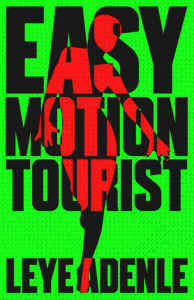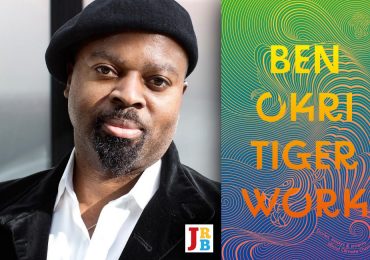Easy Motion Tourist
Leye Adenle
Cassava Republic Press/Pan Macmillan South Africa 2016
1.
On September 21st 2015, a Monday, a man was abducted from his farm in Ondo state, Nigeria. It was his seventy-seventh birthday.
His name was Samuel Oluyemisi Falae—Olu Falae for short. No ordinary citizen, Olu Falae was a former finance minister and presidential contender, having run for the latter office in 1999. After his release, Falae claimed that his kidnappers were Fulani, nomadic herdsmen who often clash with farmers in that part of the country, which is a few hundred kilometres north of Lagos, Nigeria’s economic hub and Africa’s largest city. In one colourful account, Falae is quoted as saying his kidnappers ‘slashed him with their cutlasses and dragged him into the bush, threatening to kill him every half an hour’.
Falae was found three days after he disappeared; whether a substantial ransom was paid or not is contested. A month after his abduction, it came to light that the Nigerian government had issued a $5 billion fine—that’s five billion USD, an unheard-of sum—against the country’s largest mobile phone operator, MTN.
In South Africa, we took note. MTN is a South African company; a fine that large represented an indirect raid by a foreign power on our collective wealth. It seemed to be a new method of tribute extraction by one nation against a rival.
The ostensible reason for the fine was that MTN was the biggest culprit in the ongoing saga of Nigeria’s unregistered mobile phone SIM card problem. Millions of active SIMs were (and remain) unlinked to individual users in Nigeria, a state of affairs that is not only illegal there, but also has—according to Nigeria’s security services—fueled crime on every level, from common burglary to international terrorism.
And kidnapping: the authorities claimed that Falae’s abductors conducted ransom negotiations via MTN SIM cards—cards for which MTN could provide no reliable data, in terms of unmasking the voices on the other end of the line. In South Africa, financial journalists grasping for an explanation of the company’s unfathomable economic calamity suddenly had one served up on a platter: Falae’s kidnapping was the final straw; Nigeria’s outraged government had had enough; the delinquent mobile phone operator had to pay, and the price was $1,000 for each of MTN’s 5.1 million unregistered SIMs.
2.
Whether a crime whose basic facts are in doubt—was a ransom paid? did police rescue Falae, or was he set free?—could trigger a trans-continental, billion-dollar proxy trade war or not, Nigeria’s millions of unregistered SIM cards certainly make for richly-sown territory to explore, if you’ve the imagination of a crime writer. And Leye Adenle duly adds MTN to the witness roll in his debut crime novel, Easy Motion Tourist. (To be fair, the company is never called out by its brand name in the book, but it’s there all along.)

The novel’s title derives from a Fatai Rolling Dollar song about nocturnal misadventure. The unwitting ‘tourist’ in this case is one Guy Collins, a British journalist working for a fly-by-night news startup in the UK who is sent to Lagos to cover Nigeria’s impending elections. Hopelessly green—he doles out his developed-world credulity like leaflets to every passerby—Guy arrives expecting a straightforward gig. The stories that he will file from his comfortable hotel room (which will carry romance and exoticism with them; he’s in Africa, after all) will earn him street cred back home and, crucially, another shot with his half-Nigerian ex, Melissa.
Instead, on his first night, Guy meanders into a nightclub, outside of which a woman’s mutilated body is dumped, which causes a huge commotion. This attracts the attention of a shady-looking unit of policemen, who promptly identify Guy as a person of interest to their investigation, and request that he accompany them back to the station. A wild drive through the Lagos night ensues, and Guy is certain he will never see Melissa, much less the UK, again.
In jail, he meets—or rather, is rescued by—the other half of what will become the most endearing crime-fighting duo that the genre has seen in many years. Amaka is a woman whose street smarts are matched by her zeal for keeping Lagos’ sex workers safe while they’re on the job. The dead woman outside the club somehow slipped through her meticulously-knotted safety net. Like the dodgy cops, who are now being harassed by their superiors to make arrests (mutilated bodies make for bad optics during elections) Amaka needs to get to the bottom of the story. And for that, she needs Guy.
3.
The sure grip on character and plot that Adenle demonstrates, steering Guy and Amaka through his opening gambit, ensures that there’s never cause to wince about what might be called authorial ‘trope signaling’. Yes, the black woman who runs a non-profit seizes the stage from the white professional—from the moment they meet, he’s in her movie, not the other way around—but their interior lives are too convincing to allow complaint about what otherwise might seem an obvious ploy.
In fact, if there’s a master trope coursing through Easy Motion Tourist, it’s an oft-under-emphasised one in African fiction: the book derives much of its narrative power from what might be termed the ‘clash of modernities’ that’s a daily occurrence in Nigeria, and indeed in African countries across the continent. Having a white character helps make this clash more obvious. The African present day effortlessly pushes potential rivals for attention in our globalised discourse—the state of the London Stock Exchange, say, or a political scandal in France—to the margins of consciousness. Guy’s haplessness ensures that the fundamental sophistication of life in Nigeria remains in sharp relief at all times. Africa’s modernity is an all-consuming prospect for the newcomer.
As Adenle dances sure-footedly in his pages with a white Westerner’s perspective, so too does he lay down a crafty commentary on Nigeria’s relationship with its former colonial Metropolitan. Namely: it barely exists. Nigerians now manage relationships with the global North, the global South and the global In-between quite on their own. If a hallmark of modernity is that everything can and eventually will be commodified, then Nigeria is now the Metropolitan—in Nigeria at least. Your modernity, wherever it flew in from, is subject to strict exchange controls, and, local or foreign, you are the commodity, surveilled and tracked by a thousand unregistered SIMs. As Guy learns, when you leave home for Africa these days, in the clash of modernities you lose the power to negotiate the terms of your continued subsistence.
Here, then, is a classic ‘Johnny-comes-to-Joburg’ tale of urban Africa with a delightful twist. Instead of Joburg, of course, Guy is a temporary labourer in Lagos, which, meanwhile, is a Russian-doll-like city of modernities within modernities—as best exemplified by the crime at the novel’s heart. The going theory about the woman whose body was dumped outside the nightclub is that her death is related to the elections: certain of her body parts were needed for a witchdoctor’s brew, medicine to boost some local strongman’s chances during the poll. The opportunities for sleight-of-hand and subversion presented by stereotypes like this, as the mystery is slowly and entertainingly unravelled by Amaka and Guy, are expertly exploited by Adenle: in the end, what appears to be a random act of violent ‘juju’ points, in fact, to the servicing of Western markets from globalisation’s underbelly. Adenle sews it so neatly together you barely pick up the stitches.
4.
Down in the underbelly with Amaka and Guy is the mercurial Inspector Bakare Ibrahim, leader of Fire-for-Fire, the police gang that rounded Guy up at the scene of the crime. He is seconded by Sergeant Hot-Temper, who lives up to his billing by torturing suspects and, on a whim, murdering a jail-mate of Guy’s by shooting him in the face. If Ibrahim and Hot-Temper are a law unto themselves, they are also two sides of the coin of state control at street level (a very poor coin indeed, soiled and rubbed out and dropped in a gutter): management and muscle. While Hot-Temper does the dirty work, Ibrahim writes self-exonerating, half-true reports and takes endless calls from one of the higher-ups in the police chain of command, whose demands for progress on the nightclub murder are shrill and unrelenting, and who is also more interested in the correct outcome than the right one.
Ibrahim is corrupt, world-weary, put upon and inured to the extreme violence of his Fire-for-Fire crew, but somehow he also wallows pleasurably in the art of solving cases. Although suspicious of and irritated by Guy, and wistfully enamored of Amaka, he joins them on a trail that leads to the Victoria Island door of one Chief Ebenezer Amadi, and the gruesome horrors that lie behind it.
On the way, the novel detours through backstory scenes of extreme venality, compliments of both the throbbing industriousness of Lagos’ criminal element and of Adenle’s talent for conjuring up the kind of two-dimensional characters that successful crime fiction depends on. In Easy Motion Tourist, you ride with Knockout and Go-Slow, two scruple-free incompetents whose schemes bizarrely often succeed; you enter the house-cum-brothel of Catch-Fire, a deeply-unsavoury character who works for Chief Amadi; you dodge bullets with Chucks, a chop-shop operator; and you listen to The Voice, the anonymous puppet master directing Chief Amadi’s activities.
Each moment with these characters provides Adenele with an opportunity to contrast Nigeria’s various moral bankruptcies—the chief of which seems to be that it is a society, like many others around the world, predicated upon the transactionality of flesh and blood above all other human considerations—with the diligent, profit-free work of Amaka, who is as meticulous in her methods as the great Jules Maigret. (In an interview, Adenle professed admiration for the fictional French commissaire.) Her tiny operation, called Street Samaritans, runs—clash of modernities alert!—on Microsoft Excel. She keeps the details of as many johns as possible in her database, which is updated constantly, and referred to when sex workers call her on any one of her unregistered SIM cards—ideally before they get into a car with an unfamiliar client. The man’s HIV status, his sexual proclivities, his number of wives: it’s all there in Amaka’s little black laptop, helping her counsel the women phoning in whether to turn the trick or not. Amaka, in short, is the one giving the green light in Lagos’ red light district.
5.
The crime that Amaka and Guy get caught up in goes far beyond prostitution and murder, and as they work their way—sometimes together, sometimes separately—toward Chief Amadi’s dark secret, the novel gains a new urgency. It takes a few pages before you realise why: Adenle has subtly introduced elements of the police procedural into the final third of his book, with Ibrahim playing a suddenly more pivotal role as he marshals resources to keep tabs on Amaka and Guy, and draw the net close around Chief Amadi.
This is a wholly refreshing change of pace, and a necessary reminder that the caprice of the corrupt state can occasionally work in your favour. When Ibrahim wants to be a good cop, he can be a very good one indeed. Cases that receive his full attention don’t stay unsolved for long. There is something satisfying about the turnkey-like series of events that Adenle sets in motion once the ‘procedural’ part of his novel is in full swing.
Partly, this satisfaction derives from elements external to Easy Motion Tourist: it goes back to the clash of modernities, and to the fact that novels are more than the sum of their discrete storylines. Adenle, it seems, has taken it upon himself to breathe new life into an old-fashioned form of fiction, and succeeds on his terms, which, it so happens, are African terms. It falls within African literature’s purview, then, to have charge of police procedurals as much as it has charge of other genres—magic realism, say, or ‘women’s fiction’, or LGBTQI+ pulp. It may come as a surprise to some that this state of literary affairs will come as a surprise to many. The panache with which Adenle opens new avenues for crime fiction, however, coupled with the deftness with which he sketches a mystery according to the genre’s classic conventions, makes the conclusion that Africa is part of crime fiction’s vanguard irresistible.
Especially when the fiction is this good. For the satisfaction that Easy Motion Tourist delivers derives primarily from being caught up in the story of Amaka and Guy, who are, in turn, caught up in tumult of Lagos. The novel’s penultimate scene, in which Inspector Ibrahim mulls over the different ways he could begin his report—what to put in, what to leave out?—and pauses for two phone calls, one with his boss, the other from an unregistered SIM, constitutes a top-class spinetingler of a conclusion. The closing, scene, meanwhile—this time Amaka’s on the phone with an unknown number (MTN, there, to the last!)—happily points to a second book in the series.
But don’t get ahead of yourself: this is the modern crime novel you’ve been looking for. It’s a pearler of a debut. Go on, get lost in Lagos with Amaka and Guy.
Index
Music
- ‘Easy Motion Tourist’ by Highlife/Fatai Rolling Dollar
Stories
- ‘Bartleby, the Scrivener’ by Herman Melville
Topics
- The Clash of Modernities
- MTN
- Unregistered SIM cards





